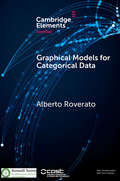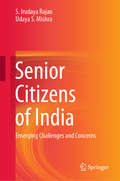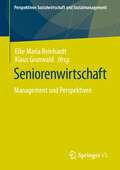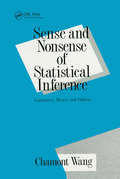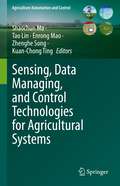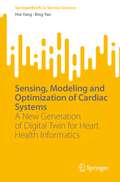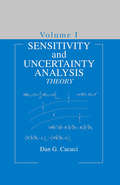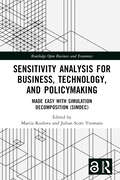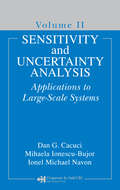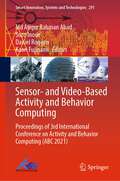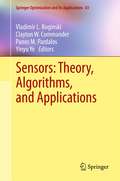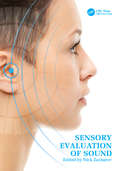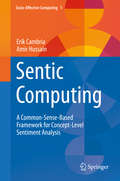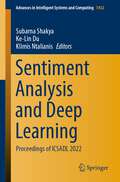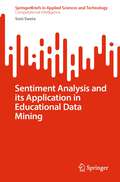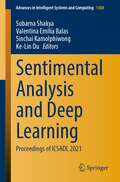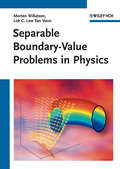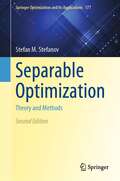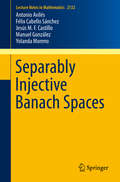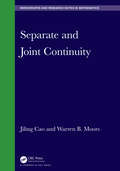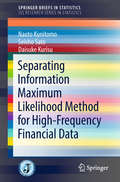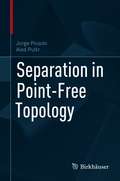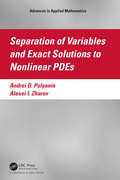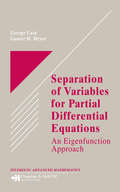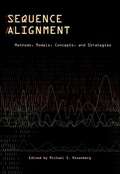- Table View
- List View
Semstat Elements: Graphical Models For Categorical Data (Semstat Elements Series)
by Alberto RoveratoSenior Citizens of India: Emerging Challenges and Concerns
by Udaya S. Mishra S. Irudaya RajanThis book provides an overview of multiple facets of ageing and its evolving dynamics in various Indian states. It elaborates on key dimensions like health, dependence and disability, as well as living arrangements for the elderly. Drawing on information from National Sample Surveys to offer readers a broader and richer understanding of the evolving demographic reality in India, the book addresses a range of detailed policies and programmes for the elderly in India. Given its scope, the book is essential reading for students and researchers in the fields of sociology, demography, economics and development studies. It also offers a valuable reference guide for anyone engaged in planning and policy formulation for social security, welfare of the aged or mainstreaming ageing concerns.
Seniorenwirtschaft: Management und Perspektiven (Perspektiven Sozialwirtschaft und Sozialmanagement)
by Klaus Grunwald Elke Maria ReinhardtDer Band skizziert Seniorenwirtschaft als einen vielfältigen Bereich des Wirtschaftens, der sich im Kern mit dem Management von Dienst- und Versorgungsleistungen befasst, die für interessierte und bedürftige ältere Menschen und Hochbetagte am Markt angeboten und von ihnen in Anspruch genommen werden. Er fokussiert dabei die Bereiche soziale Dienstleistungen, Wohnen, Betreuung und insbesondere Pflege. Der Sammelband thematisiert die wachsenden Herausforderungen für das Management und gibt einen Einblick in relevante Grundlagen, Konzepte und Methoden des Managements der genannten Bereiche der Seniorenwirtschaft. Im Zentrum steht dabei die Perspektive der verantwortlichen Führungskräfte.
Sense and Nonsense of Statistical Inference: Controversy: Misuse, and Subtlety
by Charmont WangThis volume focuses on the abuse of statistical inference in scientific and statistical literature, as well as in a variety of other sources, presenting examples of misused statistics to show that many scientists and statisticians are unaware of, or unwilling to challenge the chaotic state of statistical practices.;The book: provides examples of ubiquitous statistical tests taken from the biomedical and behavioural sciences, economics and the statistical literature; discusses conflicting views of randomization, emphasizing certain aspects of induction and epistemology; reveals fallacious practices in statistical causal inference, stressing the misuse of regression models and time-series analysis as instant formulas to draw causal relationships; treats constructive uses of statistics, such as a modern version of Fisher's puzzle, Bayesian analysis, Shewhart control chart, descriptive statistics, chi-square test, nonlinear modeling, spectral estimation and Markov processes in quality control.
Sensing, Data Managing, and Control Technologies for Agricultural Systems (Agriculture Automation and Control)
by Tao Lin Shaochun Ma Enrong Mao Zhenghe Song Kuan-Chong TingAgricultural automation is the emerging technologies which heavily rely on computer-integrated management and advanced control systems. The tedious farming tasks had been taken over by agricultural machines in last century, in new millennium, computer-aided systems, automation, and robotics has been applied to precisely manage agricultural production system. With agricultural automation technologies, sustainable agriculture is being developed based on efficient use of land, increased conservation of water, fertilizer and energy resources. The agricultural automation technologies refer to related areas in sensing & perception, reasoning & learning, data communication, and task planning & execution. Since the literature on this diverse subject is widely scattered, it is necessary to review current status and capture the future challenges through a comprehensive monograph.In this book we focus on agricultural automation and provide critical reviews of advanced control technologies, their merits and limitations, application areas and research opportunities for further development. This collection thus serves as an authoritative treatise that can help researchers, engineers, educators, and students in the field of sensing, control, and automation technologies for production agriculture.
Sensing, Modeling and Optimization of Cardiac Systems: A New Generation of Digital Twin for Heart Health Informatics (SpringerBriefs in Service Science)
by Hui Yang Bing YaoThis book reviews the development of physics-based modeling and sensor-based data fusion for optimizing medical decision making in connection with spatiotemporal cardiovascular disease processes. To improve cardiac care services and patients’ quality of life, it is very important to detect heart diseases early and optimize medical decision making. This book introduces recent research advances in machine learning, physics-based modeling, and simulation optimization to fully exploit medical data and promote the data-driven and simulation-guided diagnosis and treatment of heart disease. Specifically, it focuses on three major topics: computer modeling of cardiovascular systems, physiological signal processing for disease diagnostics and prognostics, and simulation optimization in medical decision making. It provides a comprehensive overview of recent advances in personalized cardiac modeling by integrating physics-based knowledge of the cardiovascular system with machine learning and multi-source medical data. It also discusses the state-of-the-art in electrocardiogram (ECG) signal processing for the identification of disease-altered cardiac dynamics. Lastly, it introduces readers to the early steps of optimal decision making based on the integration of sensor-based learning and simulation optimization in the context of cardiac surgeries. This book will be of interest to researchers and scholars in the fields of biomedical engineering, systems engineering and operations research, as well as professionals working in the medical sciences.
Sensitivity & Uncertainty Analysis, Volume 1: Theory
by Dan G. CacuciAs computer-assisted modeling and analysis of physical processes have continued to grow and diversify, sensitivity and uncertainty analyses have become indispensable investigative scientific tools in their own right. While most techniques used for these analyses are well documented, there has yet to appear a systematic treatment of the method based on adjoint operators, which is applicable to a much wider variety of problems than methods traditionally used in control theory. This book fills that gap, focusing on the mathematical underpinnings of the Adjoint Sensitivity Analysis Procedure (ASAP) and the use of deterministically obtained sensitivities for subsequent uncertainty analysis.
Sensitivity Analysis for Business, Technology, and Policymaking: Made Easy with Simulation Decomposition (SimDec) (Routledge Open Business and Economics)
by Mariia Kozlova Julian Scott YeomansSimDec is a revolution in decision-making support. SimDec “teases out” inherent cause-and-effect relationships and reveals the intricacy of relationships between sets of input and output variables. At its core, SimDec is an amalgamation of uncertainty and global sensitivity analysis with an innovative visualization technique. While straightforward and elegant, this novel approach significantly enhances the analytical capabilities of users by readily exposing seemingly, a priori, counterintuitive behaviours so that they can be readily understood by both technical specialists and non-technical users alike.This book is the first to articulate the ubiquitous applicability of SimDec and has been written by the leading proponents of the technique. The book provides the necessary background to fully understand the underlying approach and then demonstrates its applicability to a wide spectrum of fields, such as finance, entrepreneurship, energy, 3D manufacturing, geology, the environment, engineering, public policy, and even superconducting magnets. To facilitate as widespread adoption and penetration of SimDec as possible, all supporting computer codes are available, open-source, in Python, Julia, R, and Matlab.The innovative material will be of primary benefit to practitioners and researchers analyzing data from the social sciences, business, science, engineering, mathematics, and computing.The Open Access version of this book, available at http://www.taylorfrancis.com, has been made available under a Creative Commons [Attribution-Non Commercial-No Derivatives (CC-BY-NC-ND)] 4.0 license.
Sensitivity and Uncertainty Analysis, Volume II: Applications to Large-Scale Systems
by Ionel Michael Navon Mihaela Ionescu-Bujor Dan G. CacuciAs computer-assisted modeling and analysis of physical processes have continued to grow and diversify, sensitivity and uncertainty analyses have become indispensable scientific tools. Sensitivity and Uncertainty Analysis. Volume I: Theory focused on the mathematical underpinnings of two important methods for such analyses: the Adjoint Sensitivity Analysis Procedure and the Global Adjoint Sensitivity Analysis Procedure. This volume concentrates on the practical aspects of performing these analyses for large-scale systems. The applications addressed include two-phase flow problems, a radiative convective model for climate simulations, and large-scale models for numerical weather prediction.
Sensor- and Video-Based Activity and Behavior Computing: Proceedings of 3rd International Conference on Activity and Behavior Computing (ABC 2021) (Smart Innovation, Systems and Technologies #291)
by Sozo Inoue Daniel Roggen Md Atiqur Rahman Ahad Kaori FujinamiThis book presents the best-selected research papers presented at the 3rd International Conference on Activity and Behavior Computing (ABC 2021), during 20–22 October 2021. The book includes works related to the field of vision- and sensor-based human action or activity and behavior analysis and recognition. It covers human activity recognition (HAR), action understanding, gait analysis, gesture recognition, behavior analysis, emotion, and affective computing, and related areas. The book addresses various challenges and aspects of human activity recognition—both in sensor-based and vision-based domains. It can be considered as an excellent treasury related to the human activity and behavior computing.
Sensors: Theory, Algorithms, and Applications (Springer Optimization and Its Applications #61)
by Panos M. Pardalos Vladimir L. Boginski Yinyu Ye Clayton W. CommanderThe objective of this book is to advance the current knowledge of sensor research particularly highlighting recent advances, current work, and future needs. The goal is to share current technologies and steer future efforts in directions that will benefit the majority of researchers and practitioners working in this broad field of study.
Sensory Evaluation of Sound
by Nick ZacharovSensory Evaluation of Sound provides a detailed review of the latest sensory evaluation techniques, specifically applied to the evaluation of sound and audio. This three-part book commences with an introduction to the fundamental role of sound and hearing, which is followed by an overview of sensory evaluation methods and associated univariate and multivariate statistical analysis techniques. The final part of the book provides several chapters with concrete real-world applications of sensory evaluation ranging from telecommunications, hearing aids design and binaural sound, via the latest research in concert hall acoustics through to audio-visual interaction. Aimed at the engineer, researcher, university student or manager the book gives insight into the advanced methods for the sensory evaluation with many application examples. Introduces the fundamental of hearing and the value of sound Provides a firm theoretical basis for advanced techniques in sensory evaluation of sound that are then illustrated with concrete examples from university research through to industrial product development Includes chapters on sensory evaluation practices and methods as well as univariate and multivariate statistical analysis Six application chapters covering a wide range of concrete sensory evaluation study examples including insight into audio-visual assessment Includes data analysis with several associated downloadable datasets Provides extensive references to the existing research literature, text books and standards
Sentic Computing
by Amir Hussain Erik CambriaIn this book common sense computing techniques are further developed and applied to bridge the semantic gap between word-level natural language data and the concept-level opinions conveyed by these. In particular, the ensemble application of graph mining and multi-dimensionality reduction techniques is exploited on two common sense knowledge bases to develop a novel intelligent engine for open-domain opinion mining and sentiment analysis. The proposed approach, termed sentic computing, performs a clause-level semantic analysis of text, which allows the inference of both the conceptual and emotional information associated with natural language opinions and, hence, a more efficient passage from (unstructured) textual information to (structured) machine-processable data.
Sentiment Analysis and Deep Learning: Proceedings of ICSADL 2022 (Advances in Intelligent Systems and Computing #1432)
by Ke-Lin Du Klimis Ntalianis Subarna ShakyaThis book gathers selected papers presented at International Conference on Sentimental Analysis and Deep Learning (ICSADL 2022), jointly organized by Tribhuvan University, Nepal and Prince of Songkla University, Thailand during 16 – 17 June, 2022. The volume discusses state-of-the-art research works on incorporating artificial intelligence models like deep learning techniques for intelligent sentiment analysis applications. Emotions and sentiments are emerging as the most important human factors to understand the prominent user-generated semantics and perceptions from the humongous volume of user-generated data. In this scenario, sentiment analysis emerges as a significant breakthrough technology, which can automatically analyze the human emotions in the data-driven applications. Sentiment analysis gains the ability to sense the existing voluminous unstructured data and delivers a real-time analysis to efficiently automate the business processes.
Sentiment Analysis and its Application in Educational Data Mining (SpringerBriefs in Applied Sciences and Technology)
by Soni SwetaThe book delves into the fundamental concepts of sentiment analysis, its techniques, and its practical applications in the context of educational data. The book begins by introducing the concept of sentiment analysis and its relevance in educational settings. It provides a thorough overview of the various techniques used for sentiment analysis, including natural language processing, machine learning, and deep learning algorithms. The subsequent chapters explore applications of sentiment analysis in educational data mining across multiple domains. The book illustrates how sentiment analysis can be employed to analyze student feedback and sentiment patterns, enabling educators to gain valuable insights into student engagement, motivation, and satisfaction. It also examines how sentiment analysis can be used to identify and address students' emotional states, such as stress, boredom, or confusion, leading to more personalized and effective interventions. Furthermore, the book explores the integration of sentiment analysis with other educational data mining techniques, such as clustering, classification, and predictive modeling. It showcases real-world case studies and examples that demonstrate how sentiment analysis can be combined with these approaches to improve educational decision-making, curriculum design, and adaptive learning systems.
Sentimental Analysis and Deep Learning: Proceedings of ICSADL 2021 (Advances in Intelligent Systems and Computing #1408)
by Ke-Lin Du Valentina Emilia Balas Subarna Shakya Sinchai KamolphiwongThis book gathers selected papers presented at the International Conference on Sentimental Analysis and Deep Learning (ICSADL 2021), jointly organized by Tribhuvan University, Nepal; Prince of Songkla University, Thailand; and Ejesra during June, 18–19, 2021. The volume discusses state-of-the-art research works on incorporating artificial intelligence models like deep learning techniques for intelligent sentiment analysis applications. Emotions and sentiments are emerging as the most important human factors to understand the prominent user-generated semantics and perceptions from the humongous volume of user-generated data. In this scenario, sentiment analysis emerges as a significant breakthrough technology, which can automatically analyze the human emotions in the data-driven applications. Sentiment analysis gains the ability to sense the existing voluminous unstructured data and delivers a real-time analysis to efficiently automate the business processes. Meanwhile, deep learning emerges as the revolutionary paradigm with its extensive data-driven representation learning architectures. This book discusses all theoretical aspects of sentimental analysis, deep learning and related topics.
Separable Boundary-Value Problems in Physics
by Morten Willatzen Lok C. Lew Yan VoonInnovative developments in science and technology require a thorough knowledge of applied mathematics, particularly in the field of differential equations and special functions. These are relevant in modeling and computing applications of electromagnetic theory and quantum theory, e.g. in photonics and nanotechnology. The problem of solving partial differential equations remains an important topic that is taught at both the undergraduate and graduate level. Separable Boundary-Value Problems in Physics is an accessible and comprehensive treatment of partial differential equations in mathematical physics in a variety of coordinate systems and geometry and their solutions, including a differential geometric formulation, using the method of separation of variables. With problems and modern examples from the fields of nano-technology and other areas of physics. The fluency of the text and the high quality of graphics make the topic easy accessible. The organization of the content by coordinate systems rather than by equation types is unique and offers an easy access. The authors consider recent research results which have led to a much increased pedagogical understanding of not just this topic but of many other related topics in mathematical physics, and which like the explicit discussion on differential geometry shows - yet have not been treated in the older texts. To the benefit of the reader, a summary presents a convenient overview on all special functions covered. Homework problems are included as well as numerical algorithms for computing special functions. Thus this book can serve as a reference text for advanced undergraduate students, as a textbook for graduate level courses, and as a self-study book and reference manual for physicists, theoretically oriented engineers and traditional mathematicians.
Separable Optimization: Theory and Methods (Springer Optimization and Its Applications #177)
by Stefan M. StefanovIn this book, the theory, methods and applications of separable optimization are considered. Some general results are presented, techniques of approximating the separable problem by linear programming problem, and dynamic programming are also studied. Convex separable programs subject to inequality/ equality constraint(s) and bounds on variables are also studied and convergent iterative algorithms of polynomial complexity are proposed. As an application, these algorithms are used in the implementation of stochastic quasigradient methods to some separable stochastic programs. The problems of numerical approximation of tabulated functions and numerical solution of overdetermined systems of linear algebraic equations and some systems of nonlinear equations are solved by separable convex unconstrained minimization problems. Some properties of the Knapsack polytope are also studied. This second edition includes a substantial amount of new and revised content. Three new chapters, 15-17, are included. Chapters 15-16 are devoted to the further analysis of the Knapsack problem. Chapter 17 is focused on the analysis of a nonlinear transportation problem. Three new Appendices (E-G) are also added to this edition and present technical details that help round out the coverage. Optimization problems and methods for solving the problems considered are interesting not only from the viewpoint of optimization theory, optimization methods and their applications, but also from the viewpoint of other fields of science, especially the artificial intelligence and machine learning fields within computer science. This book is intended for the researcher, practitioner, or engineer who is interested in the detailed treatment of separable programming and wants to take advantage of the latest theoretical and algorithmic results. It may also be used as a textbook for a special topics course or as a supplementary textbook for graduate courses on nonlinear and convex optimization.
Separably Injective Banach Spaces
by Antonio Avilés Félix Cabello Sánchez Jesús M.F. Castillo Manuel González Yolanda MorenoThis monograph contains a detailed exposition of the up-to-date theory of separably injective spaces: new and old results are put into perspective with concrete examples (such as l∞/c0 and C(K) spaces, where K is a finite height compact space or an F-space, ultrapowers of L∞ spaces and spaces of universal disposition). It is no exaggeration to say that the theory of separably injective Banach spaces is strikingly different from that of injective spaces. For instance, separably injective Banach spaces are not necessarily isometric to, or complemented subspaces of, spaces of continuous functions on a compact space. Moreover, in contrast to the scarcity of examples and general results concerning injective spaces, we know of many different types of separably injective spaces and there is a rich theory around them. The monograph is completed with a preparatory chapter on injective spaces, a chapter on higher cardinal versions of separable injectivity and a lively discussion of open problems and further lines of research.
Separate and Joint Continuity (Chapman & Hall/CRC Monographs and Research Notes in Mathematics)
by Jiling Cao Warren B. MoorsSeparate and Joint Continuity presents and summarises the main ideas and theorems that have been developed on this topic, which lies at the interface between General Topology and Functional Analysis (and the geometry of Banach spaces in particular). The book offers detailed, self-contained proofs of many of the key results.Although the development of this area has now slowed to a point where an authoritative book can be written, many important and significant problems remain open, and it is hoped that this book may serve as a springboard for future and emerging researchers into this area. Furthermore, it is the strong belief of the authors that this area of research is ripe for exploitation. That is to say, it is their belief that many of the results contained in this monograph can, and should be, applied to other areas of mathematics. It is hoped that this monograph may provide an easily accessible entry point to the main results on separate and joint continuity for mathematicians who are not directly working in this field, but who may be able to exploit some of the deep results that have been developed over the past 125 years.Features Provides detailed, self-contained proofs of many of the key results in the area Suitable for researchers and postgraduates in topology and functional analysis Is the first book to offer a detailed and up-to-date summary of the main ideas and theorems on this topic
Separating Information Maximum Likelihood Method for High-Frequency Financial Data (SpringerBriefs in Statistics #0)
by Naoto Kunitomo Seisho Sato Daisuke KurisuThis book presents a systematic explanation of the SIML (Separating Information Maximum Likelihood) method, a new approach to financial econometrics.Considerable interest has been given to the estimation problem of integrated volatility and covariance by using high-frequency financial data. Although several new statistical estimation procedures have been proposed, each method has some desirable properties along with some shortcomings that call for improvement. For estimating integrated volatility, covariance, and the related statistics by using high-frequency financial data, the SIML method has been developed by Kunitomo and Sato to deal with possible micro-market noises.The authors show that the SIML estimator has reasonable finite sample properties as well as asymptotic properties in the standard cases. It is also shown that the SIML estimator has robust properties in the sense that it is consistent and asymptotically normal in the stable convergence sense when there are micro-market noises, micro-market (non-linear) adjustments, and round-off errors with the underlying (continuous time) stochastic process. Simulation results are reported in a systematic way as are some applications of the SIML method to the Nikkei-225 index, derived from the major stock index in Japan and the Japanese financial sector.
Separation in Point-Free Topology
by Jorge Picado Aleš PultrThis book is the first systematic treatment of this area so far scattered in a vast number of articles. As in classical topology, concrete problems require restricting the (generalized point-free) spaces by various conditions playing the roles of classical separation axioms. These are typically formulated in the language of points; but in the point-free context one has either suitable translations, parallels, or satisfactory replacements. The interrelations of separation type conditions, their merits, advantages and disadvantages, and consequences are discussed. Highlights of the book include a treatment of the merits and consequences of subfitness, various approaches to the Hausdorff's axiom, and normality type axioms. Global treatment of the separation conditions put them in a new perspective, and, a.o., gave some of them unexpected importance. The text contains a lot of quite recent results; the reader will see the directions the area is taking, and may find inspiration for her/his further work.The book will be of use for researchers already active in the area, but also for those interested in this growing field (sometimes even penetrating into some parts of theoretical computer science), for graduate and PhD students, and others. For the reader's convenience, the text is supplemented with an Appendix containing necessary background on posets, frames and locales.
Separation of Variables and Exact Solutions to Nonlinear PDEs (ISSN)
by Andrei D. Polyanin Alexei I. ZhurovSeparation of Variables and Exact Solutions to Nonlinear PDEs is devoted to describing and applying methods of generalized and functional separation of variables used to find exact solutions of nonlinear partial differential equations (PDEs). It also presents the direct method of symmetry reductions and its more general version. In addition, the authors describe the differential constraint method, which generalizes many other exact methods.The presentation involves numerous examples of utilizing the methods to find exact solutions to specific nonlinear equations of mathematical physics. The equations of heat and mass transfer, wave theory, hydrodynamics, nonlinear optics, combustion theory, chemical technology, biology, and other disciplines are studied.Particular attention is paid to nonlinear equations of a reasonably general form that depend on one or several arbitrary functions. Such equations are the most difficult to analyze. Their exact solutions are of significant practical interest, as they are suitable to assess the accuracy of various approximate analytical and numerical methods.The book contains new material previously unpublished in monographs. It is intended for a broad audience of scientists, engineers, instructors, and students specializing in applied and computational mathematics, theoretical physics, mechanics, control theory, chemical engineering science, and other disciplines. Individual sections of the book and examples are suitable for lecture courses on partial differential equations, equations of mathematical physics, and methods of mathematical physics, for delivering special courses and for practical training.
Separation of Variables for Partial Differential Equations: An Eigenfunction Approach
by George Cain Gunter H. MeyerSeparation of Variables for Partial Differential Equations: An Eigenfunction Approach includes many realistic applications beyond the usual model problems. The book concentrates on the method of separation of variables for partial differential equations, which remains an integral part of the training in applied mathematics. Beyond the usual model p
Sequence Alignment: Methods, Models, Concepts, and Strategies
by Michael S. RosenbergThe sequencing of the human genome involved thousands of scientists but used relatively few tools. Today, obtaining sequences is simpler, but aligning the sequences--making sure that sequences from one source are properly compared to those from other sources--remains a complicated but underappreciated aspect of comparative molecular biology.
